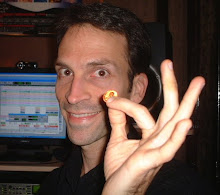In this blog, I spend a lot of time talking about the merits of cutting expenses. Judging from the latest retail sales figures, it seems like a lot of folks are getting on this bandwagon, albeit reluctantly. A slumping economy and tightening credit have finally checked our great appetite for consumption.
But reducing consumption isn't all about deprivation or stinginess. It's really about clearing the clutter from our lives in order to focus on what's really important. At the risk of sounding overly philosophical or New Age-y, I would like to suggest that consuming less might actually be good for you, and good for the world. Here are just a few ways in which you can be kind to the environment while improving your own bottom line:
Drive a smaller car (or NO car). The vehicle will cost you less to buy and insure, and you'll spend less money on gasoline while producing less CO2 . It will still get you to the gig on time, and will also be easier to park when you arrive there.
Buy in bulk via the Internet. A little comparison shopping online almost always yields the best price available, and you will save gasoline and time wasted on trips to retail stores. Fewer people driving to stores means less traffic and less pollution.
Use it Up! I know sax players who will buy a box of reeds, use the best one and throw the rest away because they are "too green". Couldn't they use those for practicing, or put them on a shelf until they age nicely? By the same token, every time I put fresh strings on my gigging bass, I transfer the old strings to my practice/teaching bass to milk a little more life out of them. That's less junk for the landfill, and lower equipment expense for me.
Live in a smaller house or share space with roommates. Rent will be lower, and you will use less electricity and gas. Cleaning a small house requires less time and less use of environmentally unfriendly detergents and cleansers. You'll also have less space tempting you to fill it up with unneeded stuff.
Recycle and buy used items. I use ice cream container lids as drainage trays for my houseplants, and worn out clothes as rags for washing my car. Musical equipment can often be found at half price by buying used. The more stuff we can keep out of the landfill now, the better off we will all be in the future.
In contrast to the above advice, many politicians and economists are now praying for an increase in consumer spending to restart the stalled economy, but the fact is that over consumption is what got us into the current crisis in the first place. We must start living more efficiently, for the sake of the environment as well as for our own long-term financial health.
Subscribe to:
Post Comments (Atom)






No comments:
Post a Comment